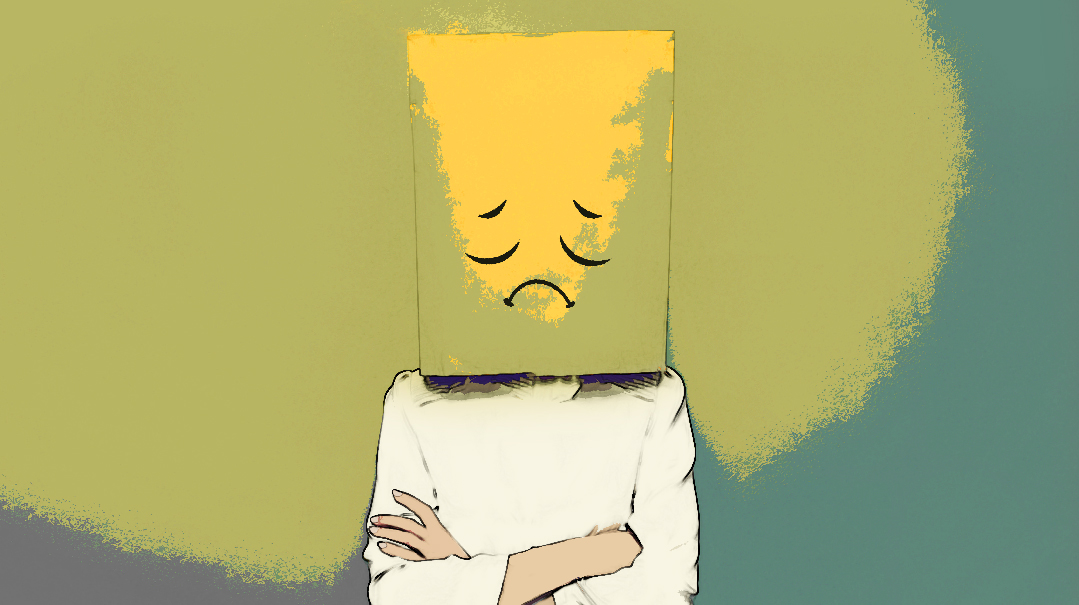Chained
| August 7, 2019“So, it’s pretty awkward for me to come here as I know you’ve spoken to my husband. Who knows what he’s told you?”

Goals: To help Sarah overcome her Internet addiction
Tools used: Stages of Changes, Psycho-education, and 12 Steps
I
t took Sarah a long time before she finally walked though my door.
I’d received a phone call from her husband, Chaim, several months back. He sounded desperate and wanted to know how he could get his wife into therapy. He reported that Sarah had become irritable, moody, unmotivated by things that used to excite her, and completely and totally dependent on her phone. Although she was still working as a graphic designer, Chaim noticed a decline in her work ethic and less interest in their three children and their marriage.
I explained to Chaim that no one could force Sarah into therapy, although he could encourage her to come. I gave him some coping techniques, and we ended the call.
A few weeks later, I received a call from Sarah. She sounded nervous and somewhat hostile. We booked an appointment for the following week. Two days before the appointment, she cancelled. This happened two more times.
In between, I received several desperate calls from Chaim. I explained to him that the motivation to change has to come from within, and until Sarah feels the need or desire to change, she probably wouldn’t come in. Chaim was devastated; if Sarah loved him and the children, as she claimed, why couldn’t she stop her destructive behavior and come to therapy like he’d begged her to for months?
Finally, after four months and three canceled appointments, Sarah arrived to our first session ten minutes late. I welcomed her into the room, and while she didn’t seem overtly hostile, she clearly had her guard up. Arms crossed, chin up, and with a glint of defiance in her hazel eyes, she got right to it: “So, it’s pretty awkward for me to come here as I know you’ve spoken to my husband. Who knows what he’s told you?”
“Hey, Sarah. Welcome. That’s a pretty uncomfortable feeling to come into your first session with. I’m happy you made it.”
“Oh! You’re sarcastic, too?” The chin went higher and the eyes closed further.
“I wasn’t being sarcastic at all. What did you hear when I said that?”
“You were saying that I finally made it in, after months of canceling.”
“That’s interesting that’s what you heard. I honestly meant that even though you have some uncomfortable feelings and concerns, it’s brave of you to come in. I’m glad that you brought that up so it can be clarified.”
“Alright.” Sarah’s posture relaxed a bit. “I still feel uncomfortable about whatever Chaim told you.”
“I get that. Chaim called me to see how he could get you to come see me. I explained to him that nobody but you can bring you — in mind, body, and spirit — other than yourself. I encouraged Chaim to focus on himself and the kids, and explained that he’s not in charge of your process.”
“Seriously? So you also think Chaim’s controlling?”
“I didn’t say Chaim’s controlling. But I did say that everyone needs to be respectful of the individual process.”
“He’s totally controlling and very oversensitive. I don’t know when that happened, but he’s totally changed. Or maybe I’ve changed. Dunno, don’t care, but it’s not working for me.”
“In what ways do you think you’ve changed?”
“Why do you care? I hate how you therapists ask a million questions.”
Oh, boy. I needed an internal pause, but couldn’t take one; if Sarah sensed my hesitation, I could lose her.
“That does seem annoying…”
“Oh, my goodness! Are you serious? I just insulted you and you validated me? You guys are ridiculous.”
“Uh, Sarah? Who’s ‘you guys’?”
“You therapists!”
“Do you see more than one therapist in the room here today?” I asked half-jokingly.
“No. But I know therapists and I definitely know your type.”
“That’s funny, because we’ve known each other the same amount of time, and I don’t claim to know your type.” My words were challenging, but my posture remained open. I didn’t want Sarah to get the sense that I was taking her on too much.
“That’s ridiculous. You’re totally assuming who I am. I can see your notes now: hostile 27-year-old, frum-looking woman. Husband reports disengagement with life. Wife reports annoyance with husband and life. Client doesn’t like therapists.”
I couldn’t help but laugh. “Sarah. Look.” I showed her my blank clipboard. “Nothing yet. Blank slate. Too bad you don’t like therapists, though. I guess that means I’m not your first one.”
“Nope. Try seventh. Been in therapy since ninth grade.”
“Wanna share more about that?”
“Nope. I’m actually done here. I can’t sit here any longer. You weren’t as bad as I imagined, but I have no patience for your questions or for opening up. I promised Chaim I’d come once, and I did. I don’t know why we have to waste each other’s time.”
Sarah got up to leave and handed me cash for the full session, although she’d been in my office for less than 20 minutes.
“Sarah, before you go, I just want to know if anyone’s ever told you that you have a right to your own journey?”
Sarah looked back at me, eyes narrowing.
“What do you mean?”
“I mean it sounds like you’ve been up against a lot of stress for a long time, and it seems like you’ve adapted to a way of being that works for you. It may not work for others, or be objectively ideal, but you’re in charge of your own life.”
Sarah sat back down. “So you’re saying I can do whatever I want?”
“I’m saying that only you can change, and only if you want to. I can just listen. I won’t try to change you.”
“What good are you as a therapist then?”
“My job as a therapist is to help you discover your best self. It’s not for me, or Chaim, or your mother, or friend to decide what that ‘best self’ is. It doesn’t seem like you’re ready to make changes now, and that may just be where you’re at.”
Sarah stared at me, then got up again. “I gotta go. I feel like I’m going insane. My husband made me give him my phone before I came. I can’t focus here anymore, but I get you. I hadn’t heard that before. I’ll think about it. Thanks.”
And with that, Sarah walked out of my office. I sat in my chair for a couple more minutes until I was certain she wasn’t returning and then started writing my progress notes. They sounded similar to the ones Sarah had dictated, however I added “client presents as pre-contemplative in terms of her willingness to look at her behaviors/cognitions and how her actions impact her family.”
I had yet to do an official assessment with Sarah to see if she was struggling with a media/phone addiction. What I could determine from our brief interaction was that she wasn’t ready to even think about change yet.
Ready for Change?
There are different “stages of change” that a client moves through that characterizes their willingness to engage in treatment (see box). While it’s often difficult to assess exactly which stage the client is at, this model is helpful when working with eating disorders and substance abuse disorders. Instead of pathologizing the client’s unwillingness to start treatment, or relapse, it engages in a person-centered approach of flexibility and understanding that sometimes people aren’t ready to make the changes that are so obvious to others that they need to make.
Three weeks later, I received an early morning text from Sarah. “NEED 2 C U. R U FREE?” Understanding the fragility of the situation, I mentally rearranged my schedule for that day and managed to fit her in. “Yes. 2:45–3:40. Works?”
The thumbs up emoji was immediate in coming.
When Sarah walked in, her edge was gone, but her eyes were glazed, and she seemed unfocused. She got right to the point. “Last night, I did something I promised myself I would never do.”
“Oh?” My tone was neutral, open.
“I watched all night. Literally. And not the best stuff either. Not the worst. But until 6 a.m. Then I pretended I had a headache, asked my husband to go to a late minyan and get the kids off to school, put a pillow on my head and went to sleep. I didn’t even see the kids this morning, don’t know what they’re wearing or if they had a good breakfast. I felt horrible when I woke up, but truth is, I almost didn’t come today because when I did get up at 1 p.m., I started watching again.”
“Well it’s good to see you here. How do you feel right now?”
“You’re asking dumb questions. Pulling that never-ending-question therapist loop. What do you mean ‘how do I feel?’ I told you I felt terrible. What else is there?”
“There are lots of terrible feelings. There’s shame, guilt, fear, embarrassment, anger, hopelessness. You may have felt terrible physically, but not in touch emotionally. You may feel terrible that a part of you just wants to stay in your behaviors, and that you actually don’t care about the ramifications.”
“Oh,” Sarah stammered. “I guess there’s a part of me that wants to continue what I’m doing. You know the numbing, calm feeling that comes with watching and shopping online. But there’s other things that make me feel like I’m suffocating, and I hate myself. Like when my kids cry because I don’t play with them anymore, or the sheer number of lies I’ve told Chaim. I’m sick of myself.
“But like, I can’t go back to how it was. I dunno. I’ve changed, and I’m not just going to stop everything. I can’t.”
“Okay. Seems like you’re thinking about what the next steps could be. Something that makes sense for you right now.”
“Yeah. I honestly don’t want a repeat of last night. And I know it’ll just get worse.”
“How do you know?” I inquired lightly.
“Because I see how fast things have, um, deteriorated. Let’s just say there are a lot of things I promised myself I wouldn’t do, and now I don’t even think twice about it. Like social media, for example. When Chaim was in kollel a few years ago, we didn’t even have Internet. Then we needed to get it for our work, but I thought the computer — never mind the smartphone that I didn’t have then — was only going to be used during office hours and never for anything other than work. Well, now I spend hours a day watching movies online, browsing social media, and do most of my shopping on the Internet.”
“Right, progression is standard with this type of thing.” I said.
“What type of thing?” Sarah’s edge was back.
“Overuse of something. Could be anything. What I’m hearing you say is that your phone/Internet use has affected your relationship with your family, that certain boundaries keep on getting pushed, and that you would like to stop certain things, but you can’t.”
“Wait, are you saying I’m addicted?”
“I’m just repeating back what you’ve shared. Do you think you struggle with Internet addiction?”
“I’m not an addict!” Sarah laughed. “I’m a normal frum mother. My kids are well taken care of, I have friends, I’m married…” Sarah looked at me incredulously.
“I’m not labeling you, Sarah. You should know, however, that many ‘normal frum’ people can struggle with addiction. Having friends and taking care of your kids doesn’t necessarily preclude having an addiction. Look, addiction or not, you want to change some behaviors, and I can help you with that.”
Sarah nodded.
“There’s an assessment we can do together to gain a bit of clarity, if you want.”
“Where do the results go? Like, what is it?”
“It’s a test developed by a psychologist, Dr. Kimberly Young, who’s an expert in Internet addiction. It was developed over 20 years ago and is the most widely used tool to measure problematic Internet use. The results are just for us, for you to gain clarity and insight to see if you have a problem or not.”
“Um, okay. I guess…”
I proceeded to give Sarah the Young Internet Addiction Test (IAT), which is 20 straightforward questions about Internet use. Questions range from “How often do you find that you stay on-line longer than you intended?” to “How often do you snap, yell, or act annoyed if someone bothers you while you’re online?” Sarah scored an 81 out of a 100, which is at the lower end of the most problematic category. According to the IAT, Sarah’s Internet use was “causing significant problems in (her) life.”
Sarah was quiet after we took the test. I gave her the paper to review the questions and her answers. “This makes sense. I get it. But Internet addiction isn’t like a heroin addiction. I can function. I just need some boundaries and I’ll be fine.”
“I hear you. I think some psychoeducation on addiction would be a great place to start next session. It’s great that you’re reflecting about everything, though.”
“I’m still not ready to do anything yet. Is that normal?”
“Totally normal. There are different stages people go through before they feel ready to make change. Thinking about change, but not yet doing it — maybe preparing for it — is totally legitimate. I know you don’t want me to sound ‘therapisty,’ but I don’t know how to say it any other way: The fact that you showed up, shared what you did, were willing to take the test and not totally fight the results is actually amazing.”
Sarah rolled her eyes, but she smiled a lopsided grin. “Thanks. Okay, out of this vortex and into another… my kids are home in 30 minutes. I’ll let them make homemade pizza and ice cream sundaes for dinner to make up for this morning.”
“That’s a sweet thought. Do you want to book another session?”
“Um. I think so, but I can’t say now. It was a lot, today. Can I text you?”
“Sure. No problem. My door is always open for you.” And with that Sarah got up and left.
One Step Forward
I did hear back from Sarah, about ten days after that session. We booked for the end of the week.
As usual, Sarah cut right to the chase. “I was really irritated that night after our session. I don’t like being labeled. I decided I wasn’t going to come see you and I could do it on my own. Well, I’ve been trying to go at it myself, and you know the rest. It’s okay, you can gloat now.”
“What do you mean?”
“You were right. I can’t stop stuff on my own, with my own boundaries.”
I couldn’t help but chuckle. “Sarah! I don’t want to gloat! I’m sorry you had a rough couple of weeks, and it’s not my intention to be right or wrong or tell you what you are or aren’t. It also makes sense that you were agitated after last session. It was a lot of information.
“Are you ready for more? I think it might be easier if you understand a little more about addiction.”
Sarah settled back on the couch and nodded.
“Addiction is a disease, not a choice. It affects the functioning of the brain and body. The basic premise behind addiction is that when you take pleasurable actions, the reward part of your brain gets activated. When a person takes an addictive substance, there are pleasure chemicals released in his brain that makes him feel good. We’re conditioned to seek what feels good — like an addictive substance, not what feels bad — like physical or emotional pain. That’s how addictive substances become habitual. The brain seeks to repeat that pleasurable feeling.
“What’s interesting is that over time, what used to make us feel good doesn’t have the same effect, and the brain needs more of that stimulus in order to react. That’s called tolerance and explains why addiction is known as a progressive disease.”
“Yeah, I told you I experienced that. But that makes sense for alcohol, or drugs, but not for the Internet. Like I get if someone gets a high, why it could feel good, but I’m not drunk when I’m online.”
“Well, that’s the really interesting thing. There are two types of addictions — substance addictions and process addictions. Process addictions aren’t chemicals, but rather behaviors, some of which can’t even be avoided in our day-to-day lives — like eating, shopping, or relationships.
“While gambling is the only process addiction currently in the DSM, there’s been a lot of research that shows that the same parts of the brain that get activated with drugs and alcohol get activated with food, shopping, Internet, exercise, and intimacy. A substance doesn’t even need to be ingested to have that same effect on the brain.”
Sarah seemed skeptical. “I don’t get that,” she said.
“Well, think about how you feel when you’re online. Imagine you’re super stressed out, and then you go online and shop and get an amazing deal. Or you enjoy a mind-numbing hour of some random game… Feels good?”
Sarah nodded.
“I just can’t imagine getting the same relief from stress doing something other than Internet stuff. I don’t really know what I did before.”
“You’ve made a good point. We all have stressors and need to learn to cope with them appropriately. That’s also at the core of addiction. Addiction is rarely about what’s happening on the outside, but more about what’s lacking on the inside. Addiction has been called the disease of disconnection. Life is hard and full of pain. Sometimes people go through trauma, or bad experiences, and they find maladaptive ways to cope with the pain.
“Initially, the high of alcohol or drugs — also known as social lubricants — can feel amazing and connecting, as can an online friendship or relationship. But eventually those behaviors will lead the user to feel the opposite — disconnected, isolated, and more anxious. In some of the literature about addiction, they say that substances or behaviors seek to ‘fill a G-d-sized hole,’ meaning that addiction is actually a spiritual disease.”
“But I’m shomer Shabbos and keep all the mitzvos…” Sarah paled. “Actually, I just remembered… I went online last Shabbos. It was only for ten minutes, and was technically bein hashmashos, so I told myself it was okay…” She was barely whispering.
“There are some people who are more disposed to have addictive tendencies,” I continued to explain. “Two people can engage in the same behaviors — and one would become an addict and the other wouldn’t.” Sarah nodded, but she looked pale and shocked. “Let’s take it one day at a time,” I said, “a phrase that you’ll hopefully grow accustomed to hearing. Let me ask you: Do you think your problem is making your life unmanageable?”
“Yes. A week ago, I would’ve fought you on this, but why waste more time?”
“Okay, so I want to strongly recommend going a 12-step group. There, you’ll receive the support, fellowship, and understanding you deserve, as well as get clarity on the addiction and how it has taken over your life.”
“I know what those are, and you’ve got to be nuts if you think I’m walking into a church basement to hold hands with some random stranger that I know by first name and last initial only.”
“I hear you. However, the 12 steps are a blueprint for recovery. There are a few Jewish books I could recommend to you to gain further insight on how the 12 steps work within a Torah framework. The meetings, by the way, are usually in a meeting room and not in the chapel. There are also some meetings in community centers and places like that. Ask your rav for guidelines. The 12 steps are actually non-denominational, although it’s a spiritual program.”
“Fine, but the random people? I don’t want to share my life with people I don’t know and have nothing in common with.”
“The focus of these meetings is addiction. And that’s one thing you probably do have in common with the people there. Look, I’m not forcing you to do anything, I’m just recommending that you give it a shot.”
“Which one should I go to?”
“Well, I would recommend an open Alcoholics Anonymous meeting and…”
“What?! No way! I’m not an alcoholic!”
“I know. However, the principles of recovery, the unmanageability and powerlessness and the steps are universal. AA is the grandfather of all 12-step programs, and there’s usually very strong recovery there. You can just substitute the work ‘Internet’ for ‘alcohol.’
“In addition, I’d recommend an ITAA — Internet and Technology Addiction Anonymous meeting. However, unless you live in Seattle, those are only online or by phone. I believe I heard of a frum-women-only media addiction group, also on the phone — I’ll check it out and get back to you on it.”
“Okay, honestly I can’t see myself ever going to an in-person AA meeting. But the online ITAA meetings sound interesting.”
“That’s fantastic.” I gave Sarah the meeting information. “In my work with addiction, I strongly feel that working a 12-step program is at the core of lasting recovery.”
“So, if I just go to these meetings, I don’t have to come and see you?” Sarah asked with a laugh.
“You don’t have to see me!” I laughed back, enjoying the camaraderie that had suddenly crept into the room. “Yet I do recommend a clinical path to see why you developed the coping techniques you did and what exactly the Internet is fulfilling for you. Honestly, I really know very little about you, so we’d spend some time going back and seeing where your life’s journey has taken you up until now, examining certain turning points that may have lead you to this addiction.”
Sarah nodded. “Okay. I actually think I’m going to book again for next week.”
“Great. Sarah, do you think it would be helpful to have Chaim come in for a session to help you guys figure out some boundaries while you’re at this initial, maybe difficult period of realization and acceptance?”
Sarah groaned. “I really, really don’t want to come to session with him. We’ve done couples therapy before, and I’m not in the mood. But I give you permission to speak to him once if he wants to call and see what’s up. I just don’t want to be part of it.”
I didn’t push the idea further, but Sarah signed a release giving me permission to speak with Chaim about certain things and left cordially.
The journey with Sarah is evolving. She continues to come weekly to session, where we explore her family of origin, some traumatic experiences that surfaced, and work on her anxiety, communication, and self-esteem. Chaim did call, and I recommended that he also join a 12-step program — Codependents Anonymous — to help support him, and take him through his own spiritual journey of recovery. I also referred him to an individual therapist.
It’s been several months since I started seeing Sarah, and the difference is palpable. It took her a couple of months to get used to her meetings, but now she reports that weekly meetings are necessary for her sobriety. There are times when Sarah’s disease takes her over, but when relapse happens, I remind Sarah that the recovery she has worked so hard to attain didn’t disappear, and redirect her back to taking it one day at a time, striving for progress, not perfection.
(Originally featured in Family First, Issue 654)
An in-depth look into Sarah’s treatment, once she became invested in the therapeutic process and recovery, will be explored in the next therapy toolbox installments.
Abby Delouya maintains a private practice in Montreal and works in schools as a youth and addictions counselor.
Disclaimer: This article is for psycho-educational purposes only, not diagnostic purposes, and does not serve as a replacement for individual therapy. Scenarios are a composite of people and situations and all identifying details have been changed.
Oops! We could not locate your form.












